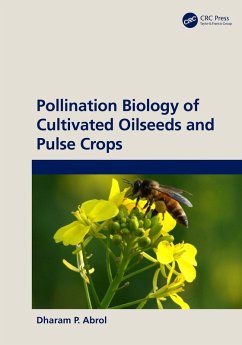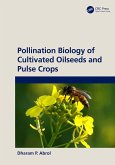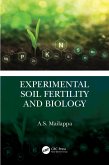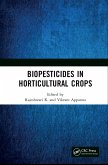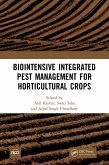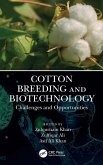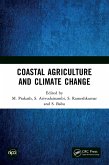Dp Abrol
Pollination Biology of Cultivated Oil Seeds and Pulse Crops (eBook, PDF)
52,95 €
52,95 €
inkl. MwSt.
Sofort per Download lieferbar

26 °P sammeln
52,95 €
Als Download kaufen

52,95 €
inkl. MwSt.
Sofort per Download lieferbar

26 °P sammeln
Jetzt verschenken
Alle Infos zum eBook verschenken
52,95 €
inkl. MwSt.
Sofort per Download lieferbar
Alle Infos zum eBook verschenken

26 °P sammeln
Dp Abrol
Pollination Biology of Cultivated Oil Seeds and Pulse Crops (eBook, PDF)
- Format: PDF
- Merkliste
- Auf die Merkliste
- Bewerten Bewerten
- Teilen
- Produkt teilen
- Produkterinnerung
- Produkterinnerung

Bitte loggen Sie sich zunächst in Ihr Kundenkonto ein oder registrieren Sie sich bei
bücher.de, um das eBook-Abo tolino select nutzen zu können.
Hier können Sie sich einloggen
Hier können Sie sich einloggen
Sie sind bereits eingeloggt. Klicken Sie auf 2. tolino select Abo, um fortzufahren.

Bitte loggen Sie sich zunächst in Ihr Kundenkonto ein oder registrieren Sie sich bei bücher.de, um das eBook-Abo tolino select nutzen zu können.
The book provides in detail information on pollination biology of oilseed and pulse crops. The book presents information on improving productivity of oilseed crops and pulses through planned pollination and safety of pollinators from pesticides.
- Geräte: PC
- mit Kopierschutz
- eBook Hilfe
Andere Kunden interessierten sich auch für
![Pollination Biology of Cultivated Oil Seeds and Pulse Crops (eBook, ePUB) Pollination Biology of Cultivated Oil Seeds and Pulse Crops (eBook, ePUB)]() Dp AbrolPollination Biology of Cultivated Oil Seeds and Pulse Crops (eBook, ePUB)52,95 €
Dp AbrolPollination Biology of Cultivated Oil Seeds and Pulse Crops (eBook, ePUB)52,95 €![Experimental Soil Fertility and Biology (eBook, PDF) Experimental Soil Fertility and Biology (eBook, PDF)]() A. S. MailappaExperimental Soil Fertility and Biology (eBook, PDF)52,95 €
A. S. MailappaExperimental Soil Fertility and Biology (eBook, PDF)52,95 €![Biopesticides in Horticultural Crops (eBook, PDF) Biopesticides in Horticultural Crops (eBook, PDF)]() Biopesticides in Horticultural Crops (eBook, PDF)54,95 €
Biopesticides in Horticultural Crops (eBook, PDF)54,95 €![Biointensive Integrated Pest Management for Horticultural Crops (eBook, PDF) Biointensive Integrated Pest Management for Horticultural Crops (eBook, PDF)]() Biointensive Integrated Pest Management for Horticultural Crops (eBook, PDF)54,95 €
Biointensive Integrated Pest Management for Horticultural Crops (eBook, PDF)54,95 €![Cotton Breeding and Biotechnology (eBook, PDF) Cotton Breeding and Biotechnology (eBook, PDF)]() Cotton Breeding and Biotechnology (eBook, PDF)83,95 €
Cotton Breeding and Biotechnology (eBook, PDF)83,95 €![Coastal Agriculture and Climate Change (eBook, PDF) Coastal Agriculture and Climate Change (eBook, PDF)]() Coastal Agriculture and Climate Change (eBook, PDF)54,95 €
Coastal Agriculture and Climate Change (eBook, PDF)54,95 €![Genetic Diversity of Fruits and Nuts (eBook, PDF) Genetic Diversity of Fruits and Nuts (eBook, PDF)]() Genetic Diversity of Fruits and Nuts (eBook, PDF)173,95 €
Genetic Diversity of Fruits and Nuts (eBook, PDF)173,95 €-
-
-
The book provides in detail information on pollination biology of oilseed and pulse crops. The book presents information on improving productivity of oilseed crops and pulses through planned pollination and safety of pollinators from pesticides.
Dieser Download kann aus rechtlichen Gründen nur mit Rechnungsadresse in A, B, BG, CY, CZ, D, DK, EW, E, FIN, F, GR, HR, H, IRL, I, LT, L, LR, M, NL, PL, P, R, S, SLO, SK ausgeliefert werden.
Produktdetails
- Produktdetails
- Verlag: Taylor & Francis eBooks
- Seitenzahl: 322
- Erscheinungstermin: 14. März 2024
- Englisch
- ISBN-13: 9781003858249
- Artikelnr.: 69854834
- Verlag: Taylor & Francis eBooks
- Seitenzahl: 322
- Erscheinungstermin: 14. März 2024
- Englisch
- ISBN-13: 9781003858249
- Artikelnr.: 69854834
- Herstellerkennzeichnung Die Herstellerinformationen sind derzeit nicht verfügbar.
Dr D. P. Abrol, Ex-Dean, Faculty of Agriculture, Sher-e-Kashmir University of Agricultural Sciences, has served university in various capacities. He has served as Head of the Division of Entomology from August 2008 to February 2015 and Controller of Examinations and Director Education during 2012. Prof Abrol has served university for 35 years in various capacities. He has specialized in pest management, honeybee management and pollination biology. Prof Abrol has an impressive publication record, having authored 22 books, 12 manuals, and contributed to 60 book chapters. Furthermore, he has published over 250 original research papers in national and international journals. He has successfully completed over 9 externally funded projects and engaged in two collaborative research projects with international organizations based in Poland and Switzerland. Prof Abrol's expertise has led him to visit countries such as Switzerland, Poland, South Korea, Malaysia, Saudi Arabia, and others as a special invitee. His contributions have been acknowledged with letters of appreciation from various organizations. Prof Abrol is first from Jammu & Kashmir elected to be elected as Fellow of the National Academy of Agricultural Sciences, India, and a Fellow of the Royal Entomological Society London, UK.
He is a recipient of the Young Scientist Award (1992) - conferred by the Jammu and Kashmir State Council for Science and Technology a prestigious state award for his outstanding contributions in the field of agricultural sciences.
He is also the recipient of Pran Vohra Award 1993 - a prestigious Young Scientist Award conferred by the Indian Science Congress Association, Calcutta, for his outstanding and innovative research in the field of agricultural sciences.
He was also conferred the Prof T. N. Ananthakrishnan Award 1997-1998 - a prestigious national award for his outstanding contributions in the field of entomology by the T. N. Ananthakrishnan Foundation, G.S. Gill Research Institute, Chennai. Prof Abrol won the Dr Rajendra Prasad Puruskar 1999-2000 award - a prestigious national award from the Indian Council of Agricultural Research, New Delhi, for his Hindi book on beekeeping entitled 'Madhmakhi Palan-Sidhant Evam Vidhian'. He received the 11th Apicultural Association Award (2010) for outstanding contributions in apiculture. King Saud University conferred on him a gold medal for development of apiculture in Asia. At present Prof Abrol is Member PRT team for Accreditation of several universities. Member QRT team for evaluation of AICRP Projects. Expert member Neonicotinoids Group Asian Countries. Serving as Expert for various selection committees
He is a recipient of the Young Scientist Award (1992) - conferred by the Jammu and Kashmir State Council for Science and Technology a prestigious state award for his outstanding contributions in the field of agricultural sciences.
He is also the recipient of Pran Vohra Award 1993 - a prestigious Young Scientist Award conferred by the Indian Science Congress Association, Calcutta, for his outstanding and innovative research in the field of agricultural sciences.
He was also conferred the Prof T. N. Ananthakrishnan Award 1997-1998 - a prestigious national award for his outstanding contributions in the field of entomology by the T. N. Ananthakrishnan Foundation, G.S. Gill Research Institute, Chennai. Prof Abrol won the Dr Rajendra Prasad Puruskar 1999-2000 award - a prestigious national award from the Indian Council of Agricultural Research, New Delhi, for his Hindi book on beekeeping entitled 'Madhmakhi Palan-Sidhant Evam Vidhian'. He received the 11th Apicultural Association Award (2010) for outstanding contributions in apiculture. King Saud University conferred on him a gold medal for development of apiculture in Asia. At present Prof Abrol is Member PRT team for Accreditation of several universities. Member QRT team for evaluation of AICRP Projects. Expert member Neonicotinoids Group Asian Countries. Serving as Expert for various selection committees
Section 1. Oilseeds
1. Oil crops-An introduction
2. Production constraints
3. Pollination in oil crops
4. Brassicas
5. Sunflower
6. Sesamum
7. Safflower
8. Groundnut
9. Soybean
10. Cotton
11. Castor
12. Oil Palm
13. Coconut
14. Olive
15. Planned pollination
16. Protecting honeybees from pesticides
Section 2 Pulses
17. Pulses - An Introduction
18. Leguminosae (Beans)
19. Cowpea
20. Chickpea
21. Pigeon pea
22. Pulses production way forward
1. Oil crops-An introduction
2. Production constraints
3. Pollination in oil crops
4. Brassicas
5. Sunflower
6. Sesamum
7. Safflower
8. Groundnut
9. Soybean
10. Cotton
11. Castor
12. Oil Palm
13. Coconut
14. Olive
15. Planned pollination
16. Protecting honeybees from pesticides
Section 2 Pulses
17. Pulses - An Introduction
18. Leguminosae (Beans)
19. Cowpea
20. Chickpea
21. Pigeon pea
22. Pulses production way forward
Section 1. Oilseeds
1. Oil crops-An introduction
2. Production constraints
3. Pollination in oil crops
4. Brassicas
5. Sunflower
6. Sesamum
7. Safflower
8. Groundnut
9. Soybean
10. Cotton
11. Castor
12. Oil Palm
13. Coconut
14. Olive
15. Planned pollination
16. Protecting honeybees from pesticides
Section 2 Pulses
17. Pulses - An Introduction
18. Leguminosae (Beans)
19. Cowpea
20. Chickpea
21. Pigeon pea
22. Pulses production way forward
1. Oil crops-An introduction
2. Production constraints
3. Pollination in oil crops
4. Brassicas
5. Sunflower
6. Sesamum
7. Safflower
8. Groundnut
9. Soybean
10. Cotton
11. Castor
12. Oil Palm
13. Coconut
14. Olive
15. Planned pollination
16. Protecting honeybees from pesticides
Section 2 Pulses
17. Pulses - An Introduction
18. Leguminosae (Beans)
19. Cowpea
20. Chickpea
21. Pigeon pea
22. Pulses production way forward
